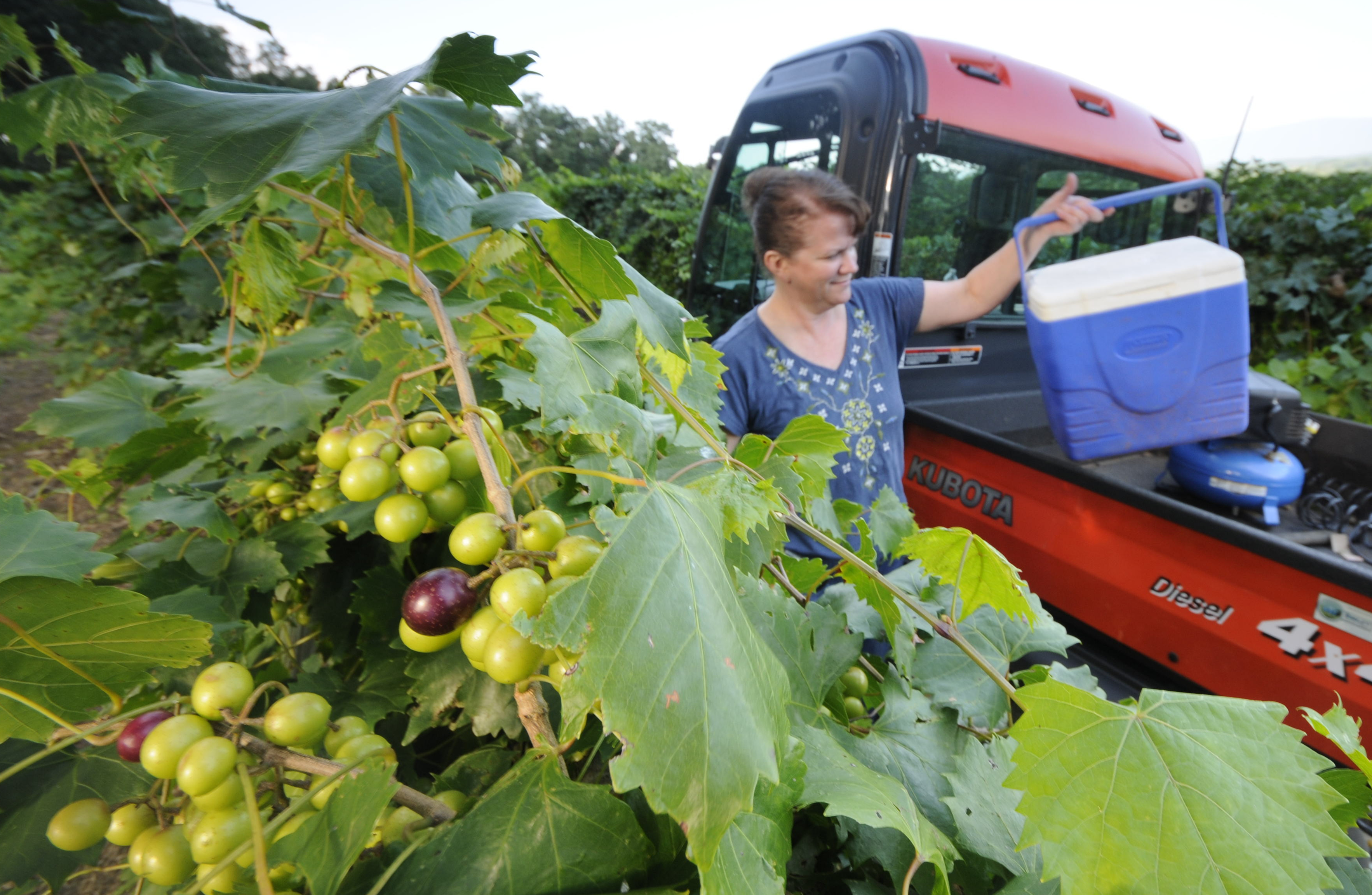Rain hard on wine grapes - French ones; muscadine grapes native to Southeast thriving
Friday, August 9, 2013
The rainy summer has been hard on wine grapes at area vineyards. Hard on "French" wine grapes, that is - muscadine grapes native to the Southeast are thriving.
Chardonnay, cabernet sauvignon and merlot are among the nine "French" grapes grown on 12 acres at Montaluce Winery and Estates in Dahlonega, Ga. Also known as European varietals, they all belong to the species vitis vinifera native to Eurasia.
Those grapes do best in areas that have a Mediterranean climate with wet winters, bone-dry summers, hot summer days that boost grapes' sugar levels and cool nights that let the grapes "rest." Only a few places in the world have such a climate: the Mediterranean, coastal Chile, parts of South Africa and Australia, and much of California, particularly its most-famous wine-growing region, Napa Valley.
On average, Napa Valley gets less than 1 inch of rain between June and September. Napa Valley's summer temperatures can exceed 100 during the day, but they drop to the 50-degree range at night. Thunderstorms are practically unknown. As for tornadoes, the entire state of California only gets a handful every year.
So Southern wineries have an uphill battle trying to raise vinifera grapes here, where summers are humid and rainy and nights are hot.
"I think [Napa] got 2 inches of rain in the month of July -- and we got that on Thursday," Montaluce general manager Warren Robertson said last week. "Our staff works a whole lot harder than the folks out in California."
Fungus and rot can set in when European varietals get wet.
Montaluce workers have sprayed fungicide in the vineyards since mid-June. They're also fertilizing the vines with a "tea" infused with worm castings, or manure from worms that feed on scraps from the winery's restaurant, Le Vigne.
"We'll make some great wines, but we probably won't make the quantity," Robertson said, explaining that "perfect" frost-free spring weather gave the grapes a head start that's still helping.
Muscadine flourishing
It's been a wet summer at Morris Vineyard and Tennessee Mountainview Winery, a 50-acre-plus farm in eastern Bradley County, Tenn., that raises 28 varieties of muscadines along with blackberries, raspberries, blueberries and several hybrid grape varieties.
"They're saying 14 inches above normal rainfall," said Eric Morris, who owns the operation with his wife, Carolyn.
"The muscadines have done good," Eric Morris said. "I haven't ever sprayed them for fungus."
Hybrid grape varieties grown there include the Concord, Catawba, Niagara, Cayuga and Chambourcin.
"The rain's been pretty rough on the grapes," Carolyn Morris said. "Some of the varieties look pretty good, and some of them don't."
Muscadine grapes also are flourishing at Georgia Winery's roughly 12-acre vineyard south of Flintstone, Ga., at the base of Lookout Mountain.
"We're getting good production," vineyard manager Adrian Prouty said. "Muscadines, they can handle quite a lot of water."
Georgia Winery doesn't spray to prevent mold, fungus and rot, because the muscadine grapes don't need it.
"We grow all our muscadines organically, so we don't spray at all," Prouty said.
The only problem muscadines have with a wet summer, he said, is the grapes plump up so much it dilutes their sugar content and flavor.
"You kind of want muscadines to stress a little bit. You don't want to baby them," Prouty said. "Droughts are actually really good."
Gave up on European grapes
Georgia Winery tried to grow European varietals for a decade before it finally gave up and went to a crop of all muscadine.
"We struggled for 10 years before we decided not to try it anymore," Prouty said. "It's just way too hard."
During a really wet summer, he said, "everything would just turn to rot."
Vinifera varietals are used in 99 percent of the world's wine, and muscadine's taste is hard for some wine lovers to swallow.
Muscadine won't be on the menu at Montaluce, which has a 25,000-square-foot winery and surrounding cottages styled to look like buildings from a village in Italy's Tuscany region.
"We have to fit that model," Robertson said. "Muscadine just does not fit for us."
Montaluce is weighing making the switch from vinifera grapes to hybrids that thrive better in the Southeast, yet have a traditional "dry" taste.
Georgia Winery makes both dry and sweet wines from the muscadine it grows.
"Me, personally, I love a dry red wine," Prouty said. "You can make a dry muscadine as well."
"It's really up to personal taste," Prouty said. "Southerners, they love sweet tea. They love sweet things."
Contact staff writer Tim Omarzu at tomarzu@timesfreepress.com or 423-757-6651.

